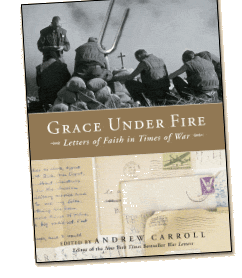
About the Legacy Project
Launched on November 11, 1998, the Legacy Project is a national, all-volunteer initiative that encourages Americans to honor and remember our nation’s veterans and troops by preserving their wartime letters and e-mails. We believe that these correspondences, whether penned by hand during the American Revolution or typed on a computer from Afghanistan or Iraq, will help current generations and those to come better understand the history of this country and the sacrifices made by U.S. service members and their families.
These letters and e-mails are also powerful reminders that our nation’s veterans and troops are not just soldiers, sailors, airmen, Marines, and Coast Guardsmen; they are spouses, parents, children, siblings, and best friends, and their letters and e-mails capture their distinct voices and personalities. Every one of these individuals has a narrative to tell, and our mission is to preserve their stories—as expressed in their own words—for posterity.
The Legacy Project is looking for correspondences from all of America's wars and on any subject matter. We prefer previously-unpublished material, but letters and/or e-mails that have already appeared in local newspapers, self-published books, and/or family web sites are all acceptable.
Topics may include, but are not limited to:
- love
- faith (including reflections on God, religion, and spirituality)
- basic training or boot camp
- leaving home to deploy overseas
- combat
- being wounded in action
- heroic acts performed by fellow servicemen and women
- prisoners of war experiences
- messages written in code
- historic events (e.g., eyewitness descriptions of General Lee’s surrender in 1865, the attack on Pearl Harbor in 1941, the landings at Inchon in 1950, the defense of Khe Sanh in 1968, or the fall of Baghdad in 2003)
- encounters with prominent military leaders
- humorous accounts (including "gripe" letters and funny anecdotes)
- letters of advice to children or younger siblings back home
- "Dear John" rejection letters
- letters from the home front describing life and current events in the U.S.
- "last" letters written by servicemen or women before they are killed in action
- letters written to or in memory of fallen comrades
- letters written by different generations of servicemen from the same family (e.g., letters by a serviceman who served in the Civil War, followed by letters from his son serving in World War I, followed by letters from his son in World War II, and so on)
- letters written by veterans months, years, or even decades after their service that offer observations or opinions that could not (or were not) expressed during wartime
- above all, any well-written letter (or e-mail) that describes an incredible story or articulates thoughtfully the nature of war and its profound effect on those involved. One overall criterion to consider is: Would you find the correspondence intriguing/dramatic/humorous/historic/insightful if you did not know the person who wrote it?
Contributing Wartime Correspondence To The Legacy Project
If you would like to submit a war letter (or letters) to the Legacy Project, please send a legible photocopy or typed transcript of the material to:
The Legacy Project
PO Box 53250
Washington, D.C. 20009
E-mails can be forwarded to: WarLetters2004@yahoo.com
Please include information about the person who wrote the letter, as well as your phone number and an address where we can contact you.
Please do not send original letters unless you are planning on disposing of the material otherwise. We cannot return anything sent to us, unless we have specifically requested to borrow it for a special project or museum display. Also, it is not necessary to write and ask us if we are interested in your correspondence. Due to staff and time constraints, it is very difficult for us to respond to these queries. If the letters (or e-mails) that you want to share are war-related, please assume that we will be interested in them.
Although we appreciate the generosity of those who have offered, the Legacy Project does not accept monetary donations under any circumstances. Nor do we solicit grants, government funding, or any other form of financial assistance. The Legacy Project is able to support itself thanks to the assistance of volunteers, who donate both their time, and all administrative expenses are paid by Legacy Project founder Andrew Carroll
Please note: Due to the enormous volume of letters and e-mails we receive it can take us several months or longer to respond. If you have sent material to the Legacy Project but have not received a reply, it is most likely because we have been overwhelmed with mail. (In some cases we have had trouble reading a contributor's handwriting and have been unable to reply.) We appreciate every letter and e-mail sent to us, and we will continue to try and respond to every submission as quickly as possible.
Thank you, and we look forward to hearing from you.
